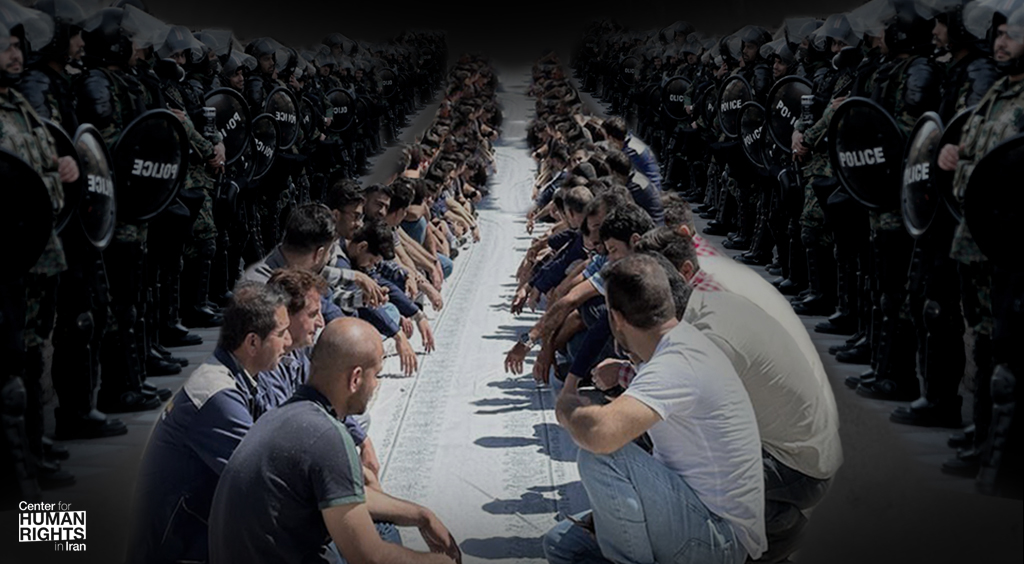 ILO Must Speak Out Forcefully Against Islamic Republic’s Abuses Against Labor
ILO Must Speak Out Forcefully Against Islamic Republic’s Abuses Against Labor
May 4, 2023 – Strikers in Iran’s oil, gas and petrochemicals industries are being threatened with firing and labor activists are being rounded up and imprisoned as the Islamic Republic turns its focus to labor in its continued drive to squash peaceful protest across the country.
In the days leading up to International Labor Day on May 1, dozens of labor activists were detained or summoned to court in Tehran, Kurdistan, and Gilan provinces, while striking seasonal contract workers in more than 100 companies in the hydrocarbon sector have been told their employment will be terminated, in violation of Iran’s obligations under both international and domestic law.
These actions follow the state’s violent suppression of protests that swept Iran after the death in state custody of Jina Mahsa Amini for her allegedly improper hijab, in which state security forces killed more than 500 protesters and arrested more than 22,000.
“After slaughtering hundreds of peaceful protesters in the streets, the authorities are now going after peaceful workers and labor activists in order to crush any remaining dissent in the country,” said Hadi Ghaemi, executive director of the Center for Human Rights in Iran (CHRI).
“These actions are in direct violation of the International Labor Organization’s (ILO) Fundamental Principles,” Ghaemi said. “Iran is a member of the ILO; if these organizations are to have any meaning at all their leaderships must speak out against severe and blatant violations by their members.”
CHRI urgently calls on the ILO to immediately release a strong and clear statement that the Islamic Republic is in profound violation of its most basic principles, and that as a member of the ILO, Iran is required to guarantee the right to strike.
Striking teachers in Iran, who have also faced unlawful prosecution, called upon the ILO last year to eject Iran as a member, given the severity of its violations of ILO Principles.
Dozens of Labor Activists Arrested Since September 2022 Protests Began
At least 42 activists and journalists who cover labor issues have been arrested or summoned to court since the nationwide antigovernment protests that began in September 2022 erupted, according to research by CHRI. (See the list of names here.)
The Iranian authorities’ crackdown on Labor Day included the arrest of teachers’ rights activist and spokesperson for the Iranian Teachers’ Trade Association (ITTA) Mohammad Habibi, whose home was also raided when he was arrested on April 28, 2023. Habibi had only recently been released from prison in February 2023 where he had been held since October 2022.
Habibi was violently re-arrested along with a number of other labor activists, among them Reyhaneh Ansarinejad, Asal Mohammadi, Hirad Pirbodaghi, Anisha Asadollahi, Sarvenaz Ahmadi, Kamyar Fakour, Hassan Ebrahimi, Jaleh Rouhzad and Oldouz Hashemi, all of whom were transferred to Evin Prison in Tehran. Habibi’s wife Khadijeh Pakzamir and labor activist Neda Naji were also detained but released after a few hours.
The arrests were condemned as “systematic brutality” in a joint statement by imprisoned labor activists Reza Shahabi and Hassan Saeidi, both senior members of the Tehran bus drivers’ union, and Keyvan Mohtadi, who are all serving six-year prison sentences at Tehran’s Evin Prison (5 years mandatory) on manufactured national security charges for their peaceful labor activism.
Companies Threaten to Fire Workers Protesting Poor Wages and Unsafe Conditions
Laborers have been increasingly going on strike in Iran since September 2022 in response to poor and unpaid wages made worse by inflation rates that exceed 42% according to the IMF (higher in certain sectors), withheld benefits such as health insurance, and extremely unsafe working conditions. The latest wave of labor strikes in the country’s oil and petrochemical industries began in late April 2023 and quickly spread.
In a statement published on April 29, 2023, the Contractual Oil Workers Protest Organizing Council announced that thousands of workers in more than 100 units in the oil, petrochemical and steel industries had joined the strike and more were joining in the coming days.
On May 1, there were labor rallies in more than a dozen cities in 11 provinces across Iran, including Khuzestan, Isfahan, Fars, Tehran, Kermanshah, Gilan, Mazandaran, Sistan and Baluchestan, Markazi, Khorasan Razavi, and Yazd.
On April 27, CEO of the Pars Special Economic Zone in Bushehr province, Sekhavat Asadi, said 4,000 protesting workers were going to be fired and replaced, and a similar fate would befall strikers at petrochemical projects in Delijan, Markazi province if they did not return to work by April 29.
On the same day, the governor of Bushehr province, Ahmad Mohammadizadeh, announced that 10,000 workers would be newly hired for the South Pars oil and gas projects amid strikes.
A worker from Kohgiluyeh and Boyer-Ahmad province who participated in the strikes, told CHRI that strikes had continued in some production units despite the threats because “workers in general, and particularly the seasonal project workers, are protesting terrible working conditions and unlivable wages.”
Project workers are especially vulnerable to such threats, yet so far, the strikes continue. “Since many workers are temporary project workers, the threat of replacement can be serious,” the worker told CHRI. He added: “We have told authorities how to make reforms, but until then the laws give us the right to protest, even though our rights aren’t recognized. We’re being suppressed for making demands and accused of activities against national security.”
For a list compiled by CHRI of the names of the labor activists and journalists covering labor issues that have been arrested since the beginning of nationwide protests in Iran in September 2022, please see this article.
